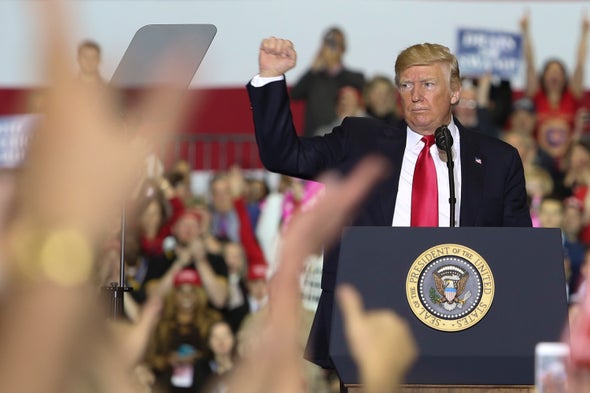Making America Hate Again Twitter and Hate Crime Under Trump Karsten M Ãœë†ullerã¢ë†â€”
Do Trump Tweets Spur Hate Crimes?
Study makes strong instance that president'south Twitter activity encourages anti-Muslim crimes

The election of Donald Trump introduced the American public to a number of firsts when it comes to politics, ane of which is a president who regularly communicates via Twitter. Trump's utilise of social media has been unusual for a president and besides the subject of abrupt criticism for the inflammatory content he sometimes posts. While nosotros know that Trump'due south Twitter audition has continued to increase dramatically since his election, currently hovering at over l million followers, we know far less near how much influence his tweets have on the way his followers recall and deport.
A disturbing new newspaper by researchers Karsten Müller and Carlo Schwarz of the University of Warwick suggests that Donald Trump'southward Islamic-related tweets may be directly linked to an increase in anti-Muslim hate crimes over the past few years. If Trump'due south tweets accept, in fact, played a role in spurring detest crimes, then social media may be playing an fifty-fifty more than powerful role in people'south lives than previously idea.
Muller and Schwarz analyzed the relationship betwixt Trump's tweets and anti-Muslim hate crimes by drawing upon a number of information sources, including the FBI's hate criminal offence information between the years 1990 and 2016 too equally Twitter usage across the country. Start, they documented that the number of anti-Muslim hate crimes recorded past the FBI increased during Trump'southward presidency. In fact, anti-Muslim crimes have been more than prevalent nether Trump compared to any other previous president, including George Westward. Bush-league following ix/11. 2d, the researchers constitute strong statistical correlations between the number of Islam-related tweets made by Trump in a single week and the number of anti-Muslim hate crimes that took place in the days and weeks that followed. Trump's anti-Islam tweets were just correlated with anti-Muslim crimes and not other types of detest crimes. Therefore, it seems likely that it was the specific content of Trump'due south tweets, and not growing anti-minority sentiment in general, that were linked to the uptick in anti-Muslim hate crimes.
Although suggestive, these connections exercise not bear witness that Trump's social media messages caused the fasten in crimes. Perhaps Trump's tweets simply reflected an already growing anti-Muslim sentiment from the public. So Muller and Schwarz analyzed the geographic connectedness between Trump's tweets and hate crimes. Since Twitter usage tends to vary by county, they looked at whether Trump'southward Islam-related tweets were related to spikes in anti-Muslim crimes where more people used Twitter. They found that the spike in hate crimes did occur mainly in U.South. counties that had loftier Twitter usage, and this link simply showed upwards later on the start of Donald Trump's presidential entrada.
Only however 1 might wonder if Twitter usage itself may have something to exercise with the prevalence of detest crimes in a particular geographic area. Maybe places with more than Twitter users are more prone to hate-driven violence. Or peradventure Twitter users themselves are more than likely to exist Republican or concord anti-Muslim sentiments. In fact, the data suggests the reverse is likely true. Counties with higher Twitter usage tend to be more Democratic and more ethnically various than counties with lower usage. They too have more citizens who adopt to get their news from MSNBC and CNN rather than Play a trick on News. The researchers besides looked at whether the areas showing a stronger pattern linking Trump'southward tweets and hate crimes were characterized by greater poverty or more crime in general; they were non. There was also no evidence that areas with higher Twitter usage are more prone to hate crimes in general.
While highly suggestive, a major limitation of this research is that it is correlational non causal. In order to bear witness that Trump's tweets truly acquired an increment in detest crimes, the researchers would need to run a carefully controlled experiment showing that exposure to such messages leads people to human activity out in mean means. This research also does not prove that Trump'south tweets crusade people to concord prejudicial views towards Muslims. In fact, the researchers themselves do not seem to believe this. Instead, they indicate out that their findings are consistent with the thought that Trump's presidency has made information technology more than socially acceptable for many people to express prejudicial or mean views that they already possessed prior to his election.
Social media has allowed agreeing people to find each other beyond large physical distances. Information technology has made it easier for people to ring together in the name of social justice and organize rallies. For ameliorate or for worse, social media has allowed a greater number of Americans to make visible their political and social views on a variety of topics. Many of u.s. may not like what we are seeing, but it is unlikely that social media is the cause of these views in the kickoff place. What seems most clear is that nosotros are only at the very kickoff of understanding how and why social media influences both politics and the way nosotros treat our beau citizens in everyday life.
Are you a scientist who specializes in neuroscience, cerebral science, or psychology? And have you read a recent peer-reviewed paper that you lot would like to write about? Delight send suggestions to Mind Matters editor Gareth Melt . Gareth, a Pulitzer prize-winning journalist, is a contributing writer at The New York Times Mag and can be reached at garethideas AT gmail.com or Twitter@garethideas.
romeopopecriente1986.blogspot.com
Source: https://www.scientificamerican.com/article/do-trump-tweets-spur-hate-crimes1/
0 Response to "Making America Hate Again Twitter and Hate Crime Under Trump Karsten M Ãœë†ullerã¢ë†â€”"
Post a Comment